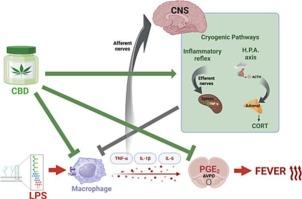Cannabidiol exerts antipyretic effects by downmodulating inflammatory mediators in LPS-induced fever
IF 5.3
2区 医学
Q1 CLINICAL NEUROLOGY
Progress in Neuro-Psychopharmacology & Biological Psychiatry
Pub Date : 2024-10-20
DOI:10.1016/j.pnpbp.2024.111178
引用次数: 0
Abstract
Contrasting to tetrahydrocannabinol (THC), cannabidiol (CBD) has virtually no psychoactive effects and thus presents a minor risk for abuse. Furthermore, emerging preclinical and clinical evidence indicates that CBD exerts several beneficial pharmacological effects, including anti-inflammatory and antioxidant properties. Even though fever is one of the responses associated with systemic inflammation, no previous study assessed the putative impact of CBD on lipopolysaccharide (LPS)-induced fever. The present study aimed to evaluate whether CBD exerts effects on febrile responses, by modulating the hypothalamic-pituitary-adrenal (HPA) axis, and the inflammatory reflex, in this response. CBD caused no change in euthermic mice, indicating that it does not alter euthermia. Conversely, CBD blunted all the assessed systemic inflammation parameters including fever (a hallmark of infection), plasma pro-inflammatory cytokines and prostaglandin E2 (PGE2) surges, and hypothalamic PGE2 (the proximal mediator of fever) synthesis. Moreover, CBD also reduced LPS-induced increase in plasma corticosterone levels and spleen TNF-α. These data are consistent with the notion that CBD has antipyretic effects, reducing peripheral febrigenic signaling (plasma pro-inflammatory cytokines levels), and eventually down-modulating hypothalamic PGE2 production, possibly in a corticosterone- and inflammatory reflex-dependent manner.

大麻二酚在 LPS 引起的发热中通过下调炎症介质发挥解热作用。
与四氢大麻酚(THC)不同,大麻二酚(CBD)几乎没有精神活性作用,因此滥用风险较小。此外,新出现的临床前和临床证据表明,大麻二酚具有多种有益的药理作用,包括抗炎和抗氧化特性。尽管发热是与全身性炎症相关的反应之一,但以前没有研究评估过 CBD 对脂多糖(LPS)诱导的发热的潜在影响。本研究旨在评估 CBD 是否通过调节下丘脑-垂体-肾上腺(HPA)轴和炎症反射来影响发热反应。CBD 对热病小鼠没有影响,表明它不会改变热病。相反,CBD 可减弱所有评估的全身炎症参数,包括发热(感染的标志)、血浆促炎细胞因子和前列腺素 E2(PGE2)激增以及下丘脑 PGE2(发热的近端介质)合成。此外,CBD 还能减少 LPS 引起的血浆皮质酮水平和脾脏 TNF-α 的增加。这些数据与 CBD 具有解热作用、减少外周发热信号传导(血浆促炎细胞因子水平)并最终下调下丘脑 PGE2 生成的观点一致,这可能是一种依赖于皮质酮和炎症反射的方式。
本文章由计算机程序翻译,如有差异,请以英文原文为准。
求助全文
约1分钟内获得全文
求助全文
来源期刊
CiteScore
12.00
自引率
1.80%
发文量
153
审稿时长
56 days
期刊介绍:
Progress in Neuro-Psychopharmacology & Biological Psychiatry is an international and multidisciplinary journal which aims to ensure the rapid publication of authoritative reviews and research papers dealing with experimental and clinical aspects of neuro-psychopharmacology and biological psychiatry. Issues of the journal are regularly devoted wholly in or in part to a topical subject.
Progress in Neuro-Psychopharmacology & Biological Psychiatry does not publish work on the actions of biological extracts unless the pharmacological active molecular substrate and/or specific receptor binding properties of the extract compounds are elucidated.

 求助内容:
求助内容: 应助结果提醒方式:
应助结果提醒方式:


